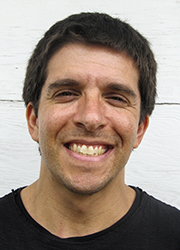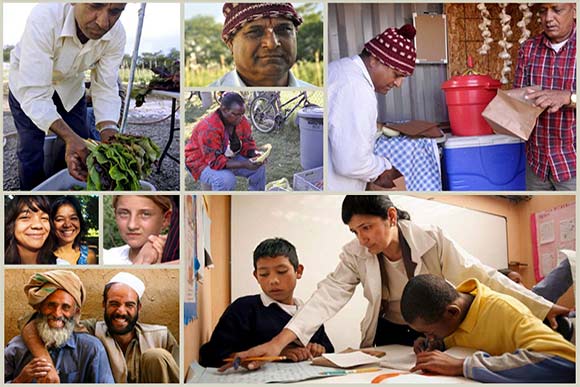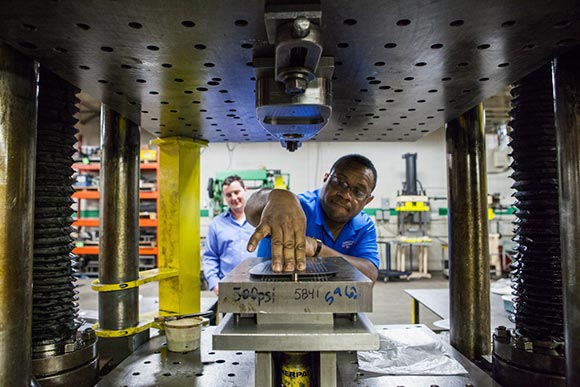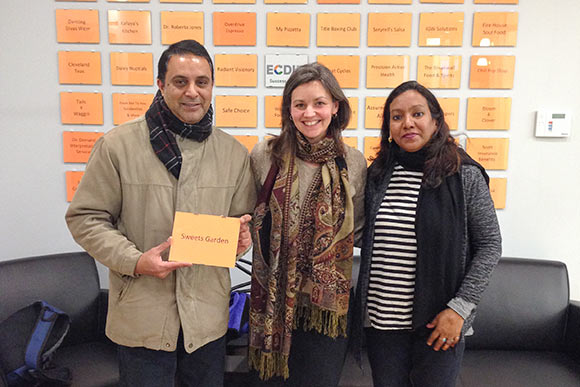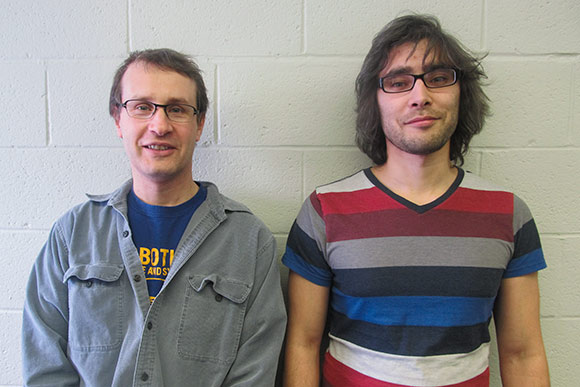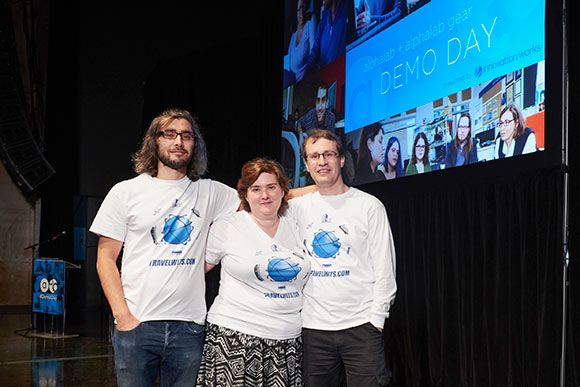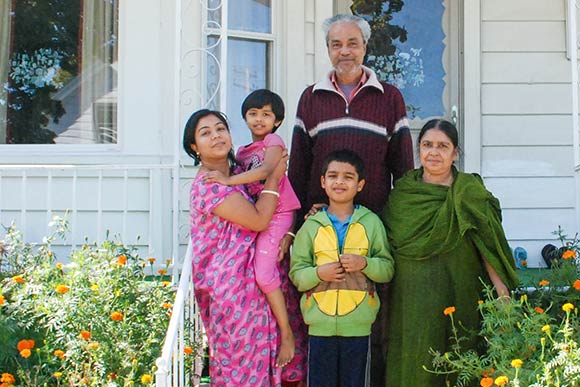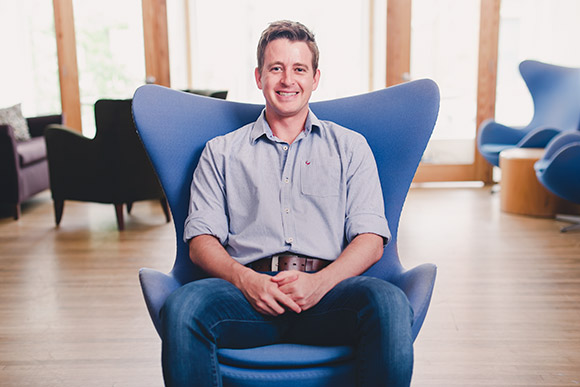Reshaping the Rust Belt through immigrant talent
A century ago the Rust Belt was the country's industrial heartland, with cities like Cleveland, Pittsburgh and Detroit innovating manufacturing processes that drew, among others, large numbers of European and Latin immigrants.
When industrial decline eliminated well-paid blue-collar jobs, entire families of new Americans left for more foreign-friendly metropolises to find better work opportunities and living conditions.
Today, many of these once-dominant industrial cities are taking steps to attract immigrants and refugees as a way to reverse a half-century of population decline. Welcoming groups in Cleveland, Dayton, Detroit and St. Louis promote immigrant integration within the region, while public officials in Cincinnati and Pittsburgh have been vocal about foreign-born entrepreneurs serving as a catalyst for spurring business creation and rebuilding downtrodden neighborhoods.
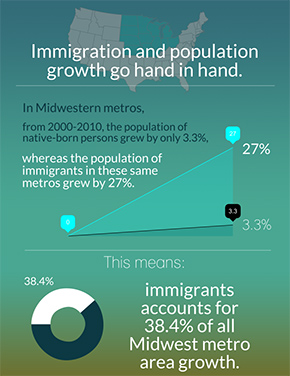 Immigrant-sparked business creation proves out this need, according to the Welcoming Economies Global Network (WE Global), a collection of 20 Rust Belt economic and community development initiatives focused on rebooting the regional economy through the integration of international residents. In ten states from Minnesota to Pennsylvania, non-native citizens have founded nearly half (45 percent) of the region's Fortune 500 companies, notes a WE Global report.
Immigrant-sparked business creation proves out this need, according to the Welcoming Economies Global Network (WE Global), a collection of 20 Rust Belt economic and community development initiatives focused on rebooting the regional economy through the integration of international residents. In ten states from Minnesota to Pennsylvania, non-native citizens have founded nearly half (45 percent) of the region's Fortune 500 companies, notes a WE Global report.
This summer, WE Global held its third annual convening in Dayton, a city heralded for immigrant-centric policies including instructing police not to ask about immigration status when they pull someone over.
The meeting gathered 300 economic development, government, and nonprofit leaders, who discussed building upon the contributions that immigrants and refugees make to their adoptive homes.
Action is being taken to welcome this demographic, officials note. In Cleveland, a pair of city councilmen have proposed placing refugees in rehabilitated homes to reinvigorate run-down west side communities -- a plan that has garnered support from Mayor Frank Jackson. Detroit's Global Detroit initiative, meanwhile, has raised millions of dollars, which will in part fund retention efforts aimed at international students.
"These [immigrants] are a hard-working population," says Rebecca Mayhew, relationship manager at the Economic Community Development Institute (ECDI), a Columbus-headquartered nonprofit offering small-business loans to immigrants and other would-be entrepreneurs. "They've been the economic drivers of cities for generations."
An Economic injection
If the Rust Belt aims to reclaim its former growth and vibrancy, then skillful immigrant entrepreneurs and refugees willing to join the labor force must be part of the equation, proponents say.
Between 2000 and 2011, the Rust Belt held 18 of the 25 fastest-shrinking cities in the U.S. At the same time, the proportion of foreign-born residents in these urban enclaves trailed the national average of 13 percent, with immigrants comprising less than five percent of the population in cities like Pittsburgh and St. Louis, according to the Brookings Institution. According to the U.S. Census, Cleveland’s population dropped below 400,000 by 2010, with foreign-born residents accounting for 4.6 percent of inhabitants.
These figures compare unfavorably to a national immigrant boom that saw the immigrant population in the U.S. grow by 25 percent over the last decade. Considering immigrant business owners account for over a quarter of all U.S. Main Street businesses - restaurants, clothing shops, grocery stores and more - rebuilding cities can't afford to bypass the economic injection these folks can bring, says Mayhew.
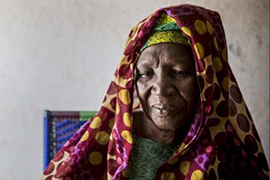 Refugee Services Collaborative
Refugee Services Collaborative
Cleveland, where ECDI has an office, is slowly embracing newcomers through large-scale, multi-organization Refugee Service Collaborative efforts, along with city-led retail programs. Groups like ECDI are willing to nurture immigrant businesses to fruition.
Syed Ahmed and Nayyer Syed, husband and wife owners of the Cleveland-area accessories store Glitter Plus in Richmond Town Square, used a loan and management training from ECDI to pursue an opportunity that has them selling affordable scarves, purses and on-site piercings.
The Pakistani couple has been in Cleveland for over a decade, following a long road that began in California in 1999 and included 16-hour work days to clothe and feed their two daughters born in the States.
Their entrepreneurial life launched with a candy kiosk located at that same shopping mall as their accessories store. Though some of their revenue is sent to extended family in Pakistan - including paying for Ahmed's brother's wedding ceremony - the newly minted shop owners recently opened a second Glitter store inside the mall and are planning a third shop at Great Lakes Mall in Mentor.
There is also talk of a house hunting trip within the community sometime next spring. "We're so happy right now," says Nyyer. "Thank God we were able to grow this business."
Though not a fan of Northeast Ohio's interminable winters, the couple is grateful for a chance to contribute to a community that gave them a boost through funding and advice on how to maintain and grow their retail venture for long-term success.
"Cleveland has given us so much," Ahmed says. "We are very appreciative."
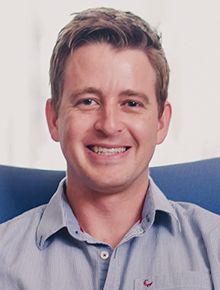 Daryn HillhouseStart of something in Cincinnati
Daryn HillhouseStart of something in Cincinnati
For Daryn Hillhouse, the clock is ticking.
A native of Cape Town, South Africa, Hillhouse moved to Cincinnati in February with wife-to-be Skye to build a software platform designed to support and enhance event experiences. Üluntu, which means "community" in Zulu, is hosted by The Brandery, a Cincinnati tech startup business accelerator.
“Accelerator" is the key word as Hillhouse is up against his visa renewal application deadline. As part of meeting stringent government criteria for renewal, the entrepreneur has created three full-time jobs through his company and supports another half dozen part-time contractors. He also must generate $200,000 in annual revenue by the end of November, which would extend his visa for another two years.
Hillhouse's ticket to renewal is The Urban Trials, a 5K run combining physical and mental challenges. Selling 1,500 entries would push him past the required revenue threshold. If the event bombs, there's a chance the Hillhouses will be back in South Africa for Christmas with no permanent place to live and no real job prospects.
"There's an enormous pressure to get this done," says Hillhouse. "The fear is very real."
Üluntu was built off Hillhouse's background as an events coordinator for road trip adventures across southern Africa. His new enterprise is meant to engage participants in advance of an event through online chatrooms and other electronic channels. A game-like achievement system can be accessed through an app, giving loyal users rewards including backstage access at a concert venue.
During the 16-week Brandery accelerator program, Hillhouse has been introduced to investors and other critical business-building resources. He believes Üluntu can integrate seamlessly into Cincinnati's low-cost startup infrastructure of accelerators, incubators and venture development organizations bullish about building a roster of new and exciting tech companies.
"Moving away from home to pursue a dream is a huge commitment," Hillhouse says. "We have no other objective but to contribute and create jobs."
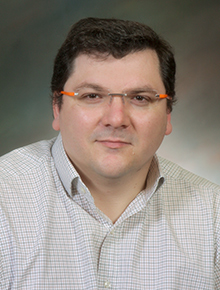 Pedro GuillenPart of a growing ecosystem
Pedro GuillenPart of a growing ecosystem
The Rust Belt is a good place to be a builder, maintains Pedro Guillen, CEO of advanced steels producer Detroit Materials in Wixom, Michigan. Guillen's two-person company creates a high-quality steel the venture's founders contend is both lighter and stronger than current options. Situated within a multi-state manufacturing hub that includes Ohio, Wisconsin and Indiana, the Michigan startup is aiming its wares at the defense, infrastructure and automotive industries.
"This region may not be perfectly suited to fundraising, but I know I can get anything I want (manufacturing-wise) in this area," says Guillen, a Spaniard whose business spun out of Detroit’s Wayne State University in 2013.
The strong steel alloy concocted by Detroit Materials will lower production costs and create efficiencies in areas like energy sustainability, says Guillen. He and his partner have validated the technology for commercialization and are currently searching for a foundry to produce the material. In August, a Michigan engineering company with a concentration on military applications gave Detroit Materials its first order.
Guillen is excited about bringing advanced materials innovation back to a struggling region-wide economy, even if working with metals is not exactly sexy. Help has come in the form of grants along with the New Economy Initiative's Technology Development Incubator Program, which opened the door for a licensing agreement and creation of the business.
Procuring additional venture capital has been a challenge, as the manufacturing sector is not known for the high returns investors expect, says Guillen. Still, international builders can capitalize on a concentrated Rust Belt effort to welcome and develop immigrant ingenuity.
"There's a strong manufacturing sector building within four or five states," says Guillen. "We're keen on being part of that ecosystem."
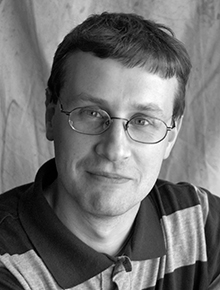 An entrepreneur's journey
An entrepreneur's journey
As recent headlines have focused on stricter state laws, border security and other topics that could make immigrants nervous, other Rust Belt cities like Pittsburgh are attempting to bolster their populations through stepped-up newcomer attraction initiatives.
Pittsburgh Mayor Bill Peduto believes immigrants can be a major part of a repopulation strategy that calls for 20,000 new city residents by 2025, a plan that has job creation as one of its cornerstones.
Maxim Likhachev, who moved to Pittsburgh with wife Alla Safonova in 2000 and again in 2010 after three-years in Philadelphia, wants to be part of that renaissance. Likhachev is co-founder of TravelWits, a website that searches multi-modal transportation alternatives to determine the most affordable route to a destination.
The Latvia native launched the company with Safonova and Arman Bimatov in 2014, about six months after booking tickets for a holiday cruise in Florida for his family. During a long week's worth of researching dozens of transportation options, a process which ultimately saved $300 per family member, Likhachev landed upon the idea for TravelWits.
"I wanted to pull the different components of travel together using real prices," says Likhachev, a research professor at Carnegie Mellon University's School of Computer Science.
Using the TravelWits search engine, affordable options take a matter of minutes rather than hours to find, Likhachev notes. Since its release, the website has helped over 35,000 visitors save an average of 30 percent on their travel plans. Eventually, the site will merge hotels, transportation, parking and other permutations into a one-stop trip-planning product.
The company is a graduate of Innovation Works Pittsburgh's AlphaLab, which provides early-stage businesses with funding, mentorship, education and work space in exchange for five percent common stock equity. Likhachev is optimistic about TravelWits' future in the region, thanks to a tech-savvy culture than invites foreign-born creatives to study at CMU or work in Google's growing Pittsburgh office.
"We're can find affordable tech talent here," Likhachev says. "Even if we open a satellite location, Pittsburgh is going to be our headquarters."
International residents creating employment throughout the Rust Belt does well to contradict stereotypes about those same folks taking jobs away from Americans, says Mayhew of ECDI. If the region wants some semblance of the halcyon days a century past, then it will be the foreign-born who make a major impact on stabilizing and eventually reversing population loss.
"We're at the point where populations can be assisted by immigrants," says Mayhew. "We need to embrace that like so many other cities have."
